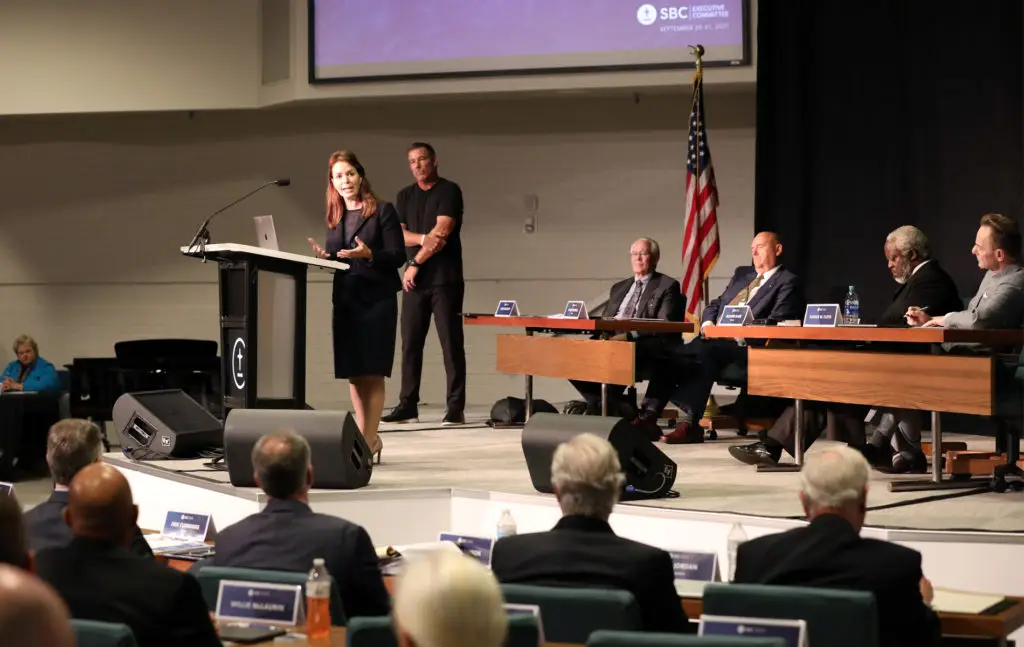NASHVILLE (BP) Debate over the long-term effects of waiving attorney-client privilege and remaining in step with the entitys fiduciary responsibility led the Southern Baptist Convention Executive Committee to call for an executive (or closed) session Monday afternoon (Sept. 20).
Discussion centered around an introductory report brought by Bruce Frank, chairman of the Sexual Abuse Task Force, and Julie Wood, chief executive officer of Guidepost Solutions. The creation of the task force was approved by messengers at the 2021 SBC Annual Meeting in June to commission and oversee and independent, third-party investigation into allegations of the mishandling of sexual abuse claims by the Executive Committee. Earlier this month, the task force announced it had selected Guidepost Solutions to conduct the investigation.
Prior to Frank and Wood addressing members, EC President and CEO Ronnie Floyd presented a statement on behalf of the Executive Committee.
The SBC Executive Committee is committed to doing the right thing in the right way in order to elevate the mission of the Convention eliciting, combining and directing our energies for the global propagation of the Gospel, he said. The SBC Executive Committee stands against all forms of sex abuse, mishandling of abuse, mistreatment of victims and any intimidation of abuse survivors in every Southern Baptist church, association, state convention, entity and affiliated organization.
As president and CEO of the SBC Executive Committee, I encourage the members of the SBC Executive Committee to work with the Sex Abuse Task Force and the Independent Review Firm in every way possible, but within our fiduciary responsibilities as assigned by the messengers. We have added two sessions to our meetings with the hope we can help bring clarity to these issues for you as you seek to find a path forward.
A 2 p.m. Concert of Prayer just for Executive Committee members preceded the first of the additional sessions referenced in the statement. The second extra session will take place Tuesday (Sept. 21) following committee meetings and the second plenary.
Early on, Frank addressed concerns over potential litigation concerning sexual abuse and its financial impact on the SBC versus the potential impact of a damaged witness.
A non-profit that doesnt have the trust of either the messengers or the mission or the mission field is going to be impacted far more by not dealing transparently with any mess than if they deal honestly with it, he said.
There is a huge cloud over our convention right now, said Frank, pastor of Biltmore Baptist Church in Arden, N.C. We can run away from it; we can pretend its not there, but there is a huge cloud that alleges that some of our leaders have not cared for, not shepherded, not responded to efforts to improve how we care for survivors and best prevent sexual abuse in our convention.
The 86 Executive Committee representatives come from all qualified regions and states to provide a broad representation of Southern Baptists. The group meets three times a year each February and September in Nashville and each June, in conjunction with the SBC annual meeting to promote the general work of Southern Baptists but also to act on behalf of the Convention to review financial statements and recommend the Conventions annual operating budget.
Wood spoke to questions of attorney-client privilege. The motion put forward by messengers spoke to the Executive Committees corporate privilege, she said.
Even though its made up of individual people, the EC as an institution actually holds the privilege for EC-related activity, she said. It is the EC, as an entity, that will make the determination about which items are privileged and whether the privilege can be waived at all. It is not up to the individual employees, staff members or even the EC members themselves.
Wood provided examples of communications that would not be considered privileged, including a third party reaching out to an EC attorney, meetings between the EC and sexual abuse survivors and a human resources consultant providing guidance on how to deal with sexual abuse.
Its important to understand that regardless of whether the EC waives privilege, there are many relative documents that are simply not covered under attorney-client privilege, she said.
The motion approved by messengers at the 2021 SBC Annual Meeting in Nashville called on the task force to agree to the accepted best-standards and practices as recommended by the commissioned third-party, including but not limited to the Executive Committee staff and members waiving attorney client privilege in order to ensure full access to information and accuracy in the review.
A 20-minute question-and-answer session with Frank and Wood by EC members probed various aspects such as the time frame of the investigation (2000-2021) and how many such investigations Guidepost has conducted for corporations. (A lot, Wood said, declining to give a specific number).
Later in the session, Executive Committee member James Freeman made a motion to go into executive session to discuss the information brought forward regarding the task force investigation. Discussion lasted longer than 10 minutes, with 54 EC members ultimately voting to enter executive session and 23 voting against.
Prior to the vote, EC members advocating a closed session cited the need to speak freely among peers. Those speaking against the motion called for transparency. All, however, seemed to echo EC Chairman Rolland Slades opening remarks at the beginning of the session.
These next two days will be significant, Slade said. We have started with prayer. We must continue seeking the Lords guidance.
I want to make one thing clear. Its the intention of our staff, officers and committee to cooperate fully [with the investigation]. We are not attempting to do anything but that.
Slade also recognized sexual abuse survivors in attendance, who received an ovation.
This article is written by Scott Barkley, national correspondent for Baptist Press. It was published on baptistpress.com.

